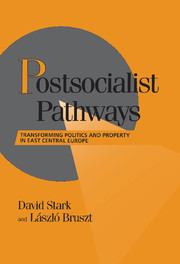Chapter 7 - Extended Accountability
from Part III - Deliberative Association
Summary
What implications do the findings from the case studies in the previous chapter have for our understanding of the relationship between political structures and reform policies? In particular, what is the relationship between public accountability and authority to carry out reform projects? The unconstrained executive model, of course, involves a widely held assumption in political theory about a trade-off between authority and accountability: The less accountable the reforming center is, the more capable it is of representing the general will; the less connected it is, the more it is capable of coordinating its program. Unrestrained by ties that bind, the unconstrained executive can behave responsibly because it has full authority to undertake the difficult tasks that the situation demands.
By contrast, our analysis suggests an organizational phenomenon, paradoxical only on first encounter: Executive capacity, understood here as the capacity to formulate and implement coherent reform programs, can be increased by limitations on the unilateral prerogatives of executive authority. Executives that are held accountable by other state institutions and held in check by organized societal actors are not necessarily weaker executives; in fact, their policies can be more effective. In this view, policy coherence for sustainable economic reforms is an outcome of extended accountability.
By extended accountability we mean the embeddedness of the decision-making center in networks of autonomous political institutions that limit the arbitrariness of incumbents. Extended accountability differs, first, from the vertical accountability of periodic elections, for it extends accountability horizontally in a set of relations through which executives are held accountable by other state institutions. By exposing policies to greater institutional scrutiny, extended accountability reduces the possibility that executives will make enormous miscalculations in rash, extreme policies. Extended accountability differs, second, from simple electoral accountability because, in contrast to the episodic character of the latter, it is extended in time. Extending accountability as a continuous, ongoing process reduces the possibilities that executives can appeal to a “crisis” in attempts to legitimate and expand their delegative electoral authority. As our analysis of the Czech and German cases suggests, far from impeding state coordination, such extended deliberation in networks of autonomous institutions that accompanies the formulation and implementation of policies actually increases the possibilities for ex ante coordination among them.
- Type
- Chapter
- Information
- Postsocialist Pathways , pp. 188 - 202Publisher: Cambridge University PressPrint publication year: 1998



